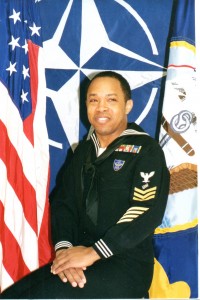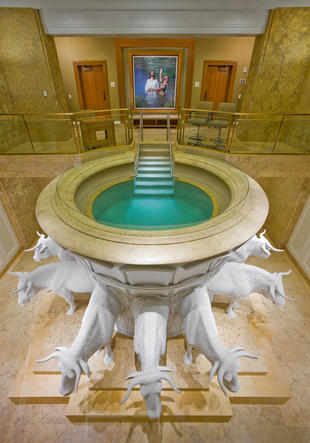 Keith L. Brown is a convert to The Church of Jesus Christ of Latter-day Saints and serves as the Ward Mission Leader in the Annapolis, Maryland Ward.
Keith L. Brown is a convert to The Church of Jesus Christ of Latter-day Saints and serves as the Ward Mission Leader in the Annapolis, Maryland Ward.
Why are Mormons Baptized for the Dead?
The dictionary defines the word “proxy” as “a person who is authorized to act on behalf of another.” A “proxy baptism” (also referred to as a vicarious baptism or baptism for the dead) is then defined as “the religious practice of baptizing a living person on behalf of an individual who is deceased; with the living person receiving the ordinance of baptism, for the deceased person.”
We learn in the New Testament that proxy baptisms, or baptisms for the dead were done during the time of the Apostle Paul. In the Apostle’s letter to the Corinthian Church these words are recorded in 1 Corinthians 15:29, “Else what shall they do which are baptized for the dead, if the dead rise not at all? Why are they then baptized for the dead?” Members of The Church of Jesus Christ of Latter-day Saints believe that this practice has been restored with the re-establishment of the Lord’s Church upon the earth today.
 The Prophet Joseph Smith first taught about the ordinance of baptism for the dead during a funeral sermon in August 1840. As part of that sermon, he read much of 1 Corinthians 15, including verse 29, and announced to those in attendance that the Lord would permit Church members to be baptized in behalf of their friends and relatives who had departed this life. He said, “the plan of salvation was calculated to save all who were willing to obey the requirements of the law of God” (Journal History of the Church, 15 Aug. 1840).
The Prophet Joseph Smith first taught about the ordinance of baptism for the dead during a funeral sermon in August 1840. As part of that sermon, he read much of 1 Corinthians 15, including verse 29, and announced to those in attendance that the Lord would permit Church members to be baptized in behalf of their friends and relatives who had departed this life. He said, “the plan of salvation was calculated to save all who were willing to obey the requirements of the law of God” (Journal History of the Church, 15 Aug. 1840).
There have been many people who lived on the earth who never heard of, or were never taught the Gospel of Jesus Christ and who were not baptized. Others lived without fully understanding the importance of the ordinance of baptism. While others were baptized, but without proper authority. Because our Heavenly Father is a loving, just, and merciful God, He has prepared a way for everyone to receive the blessings of baptism – especially those who through no fault of their own, never had the opportunity for baptism. He has therefore authorized baptisms to be performed by proxy for them.
Members of The Church of Jesus Christ of Latter-day Saints are taught and believe that baptism is essential for salvation in the Kingdom of God, and thus the sacred ordinance of baptisms for their kindred dead are performed in sacred Mormon Temples throughout the world to give those who have died without ever having had the opportunity to receive baptism, or who were baptized but without proper authority, the opportunity to receive it by proxy if that is their desire.
Our Lord and Savior Jesus Christ taught that baptism is essential to all who have lived on the earth. Said the Master, “Except a man be born of water and of the Spirit, he cannot enter into the kingdom of God” (John 3:5). The Savior Himself was our perfect exemplar. Though He was without sin, He was baptized to fulfill all righteousness and to show the way for all mankind. The account of His baptism is recorded in the Bible in Matthew 3:13-17 and also in the Book of Mormon (Another Testament of Jesus Christ) in 2 Nephi 31:5-12. This is the account that is recorded in the Book of Mormon:
And now, if the Lamb of God, he being holy, should have need to be baptized by water, to fulfil all righteousness, O then, how much more need have we, being unholy, to be baptized, yea, even by water! And now, I would ask of you, my beloved brethren, wherein the Lamb of God did fulfil all righteousness in being baptized by water?
Know ye not that he was holy? But notwithstanding he being holy, he showeth unto the children of men that, according to the flesh he humbleth himself before the Father, and witnesseth unto the Father that he would be obedient unto him in keeping his commandments. Wherefore, after he was baptized with water the Holy Ghost descended upon him in the form of a dove. And again, it showeth unto the children of men the straitness of the path, and the narrowness of the gate, by which they should enter, he having set the example before them.
And he said unto the children of men: Follow thou me. Wherefore, my beloved brethren, can we follow Jesus save we shall be willing to keep the commandments of the Father? And the Father said: Repent ye, repent ye, and be baptized in the name of my Beloved Son. And also, the voice of the Son came unto me, saying: He that is baptized in my name, to him will the Father give the Holy Ghost, like unto me; wherefore, follow me, and do the things which ye have seen me do.
Thus, from the example set by the Great Exemplar, men learn of “the straitness of the path, and the narrowness of the gate, by which they should enter”, and that baptism is essential for all people, both living and dead, for salvation in the Kingdom of God.
Misunderstandings of Mormon Baptism for the Dead
Some people have the misconception that when Mormon baptisms for the dead are performed, deceased persons are baptized into The Church of Jesus Christ of Latter-day Saints against their will. This; however, is not the case. Members are taught that each individual has his or her free agency, or the right to choose. Some people have also wondered if the mortal remains of the deceased are somehow disturbed in this process; they are not. The person acting as a proxy uses only the name of the deceased. The validity of a vicarious baptism depends on the deceased person for whom the ordinance is performed, accepting it and choosing to accept and follow the Savior while residing in the spirit world. The names of deceased persons are not added to the membership records of the Church.
Members of the Church of Jesus Christ (sometimes inadvertently called the “Mormon Church”) are baptized for their ancestors in order to establish eternal family units. There are rules governing the submission of names for Mormon temple ordinances. For the recently deceased, permission from other family members should be sought, to preserve the tender good will among the living. Mormons are not to be baptized for famous people or Holocaust victims, and doing so can bring disciplinary action and the loss of the right to submit names for Mormon temple work.
The Dead Still Live
In the Gospel of John in the Bible, in the New Testament, in chapter 5 verse 25 are recorded these words,
“Verily, verily, I say unto you, the hour is coming, and now is, when the dead shall hear the voice of the Son of God: and they that hear shall live.” Scriptures further teach that it is for this cause that the Gospel was “preached also to them that are dead, that they might be judged according to men in the flesh, but live according to God in the spirit” (1 Peter 4:6).
*Read the account of late Prophet Joseph F. Smith’s vision of the Spirit World.
Additional Resources:
